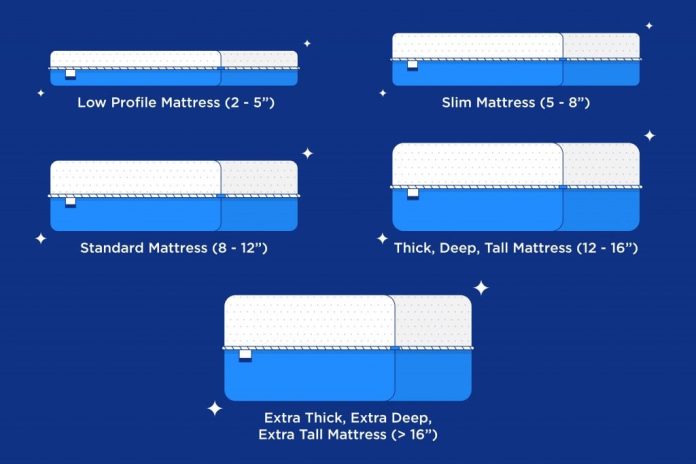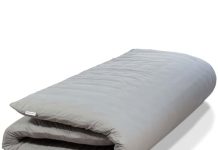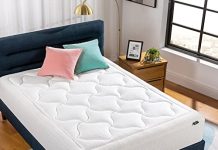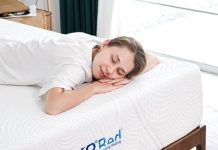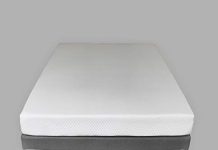When it comes to roll up mattresses, thickness plays a crucial role in ensuring comfort and support for a restful night’s sleep. But have you ever wondered just how thick most roll up mattresses are? In this article, we will explore the typical thickness range of these convenient mattresses, shedding light on the factors that influence their thickness and helping you make an informed decision for your sleep needs. So, let’s jump right in and discover the ideal thickness for your roll up mattress!
Review contents
Standard Thickness for Roll-Up Mattresses
Roll-up mattresses have become increasingly popular in recent years due to their convenient packaging and easy transportation. When it comes to the thickness of these mattresses, there is a range of options available to suit different needs and preferences. In this article, we will explore the common thicknesses of roll-up mattresses, the factors that affect their thickness, the advantages and disadvantages of different thicknesses, and how to choose the right thickness for your needs. We will also touch upon specialty roll-up mattresses with ultra-thin, extra-thick, and customizable thickness options.
Common Thicknesses
Roll-up mattresses typically come in a variety of thicknesses, ranging from as thin as 4 inches to as thick as 14 inches. However, the most common thicknesses fall between 8 and 12 inches. This range is often considered a good balance between comfort and support, catering to the needs of most sleepers.
Range of Thicknesses
While the aforementioned common thicknesses are widely available and suitable for the majority of sleepers, there are options for those who prefer thinner or thicker mattresses. Thinner roll-up mattresses, such as those with a thickness of 4 to 6 inches, are often favored for their lightweight and space-saving qualities. On the other hand, thicker roll-up mattresses, such as those with a thickness of 12 to 14 inches, are sought after by individuals who desire extra cushioning and plushness.
Factors Affecting Mattress Thickness
Several factors can influence the thickness of a roll-up mattress. These factors include the materials used, the type of mattress, and the intended use of the mattress.
Materials Used
The materials used in the construction of a roll-up mattress can greatly impact its thickness. Memory foam mattresses, for example, tend to have a thicker profile due to the multiple layers of foam used to provide optimal comfort and support. On the other hand, latex or hybrid mattresses may have a slightly thinner profile while still maintaining a high level of comfort and durability.
Type of Mattress
Different types of mattresses also have varying thickness requirements. For instance, a traditional innerspring mattress typically requires a higher thickness to accommodate the coil system and provide adequate support. On the other hand, a foam or latex mattress may have more flexibility in terms of thickness, as these materials can provide support without the need for a complex coil system.
Intended Use
The intended use of a roll-up mattress can also influence its thickness. A mattress intended for everyday use as the primary sleep surface may benefit from a thicker profile, as it provides a higher level of comfort and support for extended periods of use. On the other hand, a roll-up mattress intended for occasional use or as a guest bed may be suitable with a thinner profile, focusing more on convenience and portability.
Advantages and Disadvantages of Different Thicknesses
Each thickness option for roll-up mattresses comes with its own set of advantages and disadvantages. Let’s take a closer look at the benefits and drawbacks of thin, medium thickness, and thick roll-up mattresses.
Thin Mattresses
Thin roll-up mattresses, typically ranging from 4 to 6 inches in thickness, offer several advantages. Firstly, they are incredibly lightweight and easy to handle. This makes them a great choice for individuals who frequently move or those who need a portable mattress for camping or traveling. Additionally, thin mattresses are usually more budget-friendly compared to their thicker counterparts, making them an attractive option for those on a tight budget.
However, there are some downsides to consider with thin roll-up mattresses. Due to their limited thickness, they may lack the necessary support and cushioning for individuals who require extra comfort or suffer from back or joint pain. Furthermore, thin mattresses may not be as durable as their thicker counterparts, as they often have fewer layers and may wear out more quickly.
Medium Thickness Mattresses
Roll-up mattresses with a medium thickness, typically ranging from 8 to 10 inches, are the most commonly available options in the market. They strike a balance between comfort, support, and affordability, making them suitable for a wide range of sleepers.
One of the biggest advantages of medium thickness mattresses is their versatility. They offer sufficient support and cushioning for most sleeping positions, ensuring a comfortable night’s sleep for individuals who prefer to sleep on their back, side, or stomach. Additionally, medium thickness mattresses are often more durable than their thinner counterparts, as they usually have multiple layers of foam or other support materials.
While medium thickness mattresses are suitable for many sleepers, they may not provide the same level of luxurious comfort as their thicker counterparts. Individuals who prefer a plush, “sink-in” feeling or require extra support for specific health conditions may find that medium thickness mattresses do not meet their needs as effectively.
Thick Mattresses
Roll-up mattresses on the thicker end of the spectrum, ranging from 12 to 14 inches, offer a luxurious sleep experience with ample cushioning and support. These mattresses are often made with multiple layers of high-quality foam or other supportive materials to provide a deep level of comfort.
One of the main advantages of thick roll-up mattresses is their ability to alleviate pressure points and distribute body weight evenly. This makes them an excellent choice for individuals suffering from chronic pain or those who prioritize maximum comfort. Additionally, thick mattresses usually have heightened motion isolation qualities, reducing disturbances caused by movement during sleep.
However, thick mattresses do have some drawbacks. Their increased thickness often comes at a higher price point, making them less budget-friendly compared to thinner options. Moreover, their bulkier nature can make storage and transportation more challenging, particularly for individuals who frequently move or relocate.
Choosing the Right Thickness for Your Needs
Selecting the appropriate thickness for your roll-up mattress is essential to ensure a comfortable and supportive sleep environment. Consider the following factors when deciding on the thickness that best suits your specific needs.
Sleeping Position and Comfort
Your preferred sleeping position plays a crucial role in determining the ideal thickness for your roll-up mattress. Side sleepers generally benefit from a thicker mattress that can offer sufficient pressure relief for their hips and shoulders. Back sleepers often find medium thickness mattresses to be suitable, as they provide a good balance of support and comfort. Stomach sleepers may prefer a thinner mattress to keep their spine properly aligned and prevent excessive sinking.
Additionally, consider your personal comfort preferences. If you enjoy a plush, cloud-like feel, a thicker mattress may be the way to go. On the other hand, if you prefer a firmer sleeping surface, a thinner mattress may provide the necessary support.
Weight Considerations
Your body weight can impact how your roll-up mattress feels and performs. Heavier individuals may require a thicker mattress to ensure adequate support and prevent excessive sinking. Thicker mattresses tend to be more durable and better equipped to handle higher weight capacities. Conversely, lighter individuals may find thinner mattresses to be more suitable, as they provide sufficient support without excessive firmness.
Storage and Transportation
If you anticipate the need for frequent storage or transportation of your roll-up mattress, consider the thickness that will best accommodate these requirements. Thinner mattresses are generally easier to roll up tightly, store in compact spaces, and transport in vehicles. On the other hand, thicker mattresses may pose challenges in terms of storage and transportation due to their larger size and bulkier nature.
Specialty Roll-Up Mattresses
In addition to the common thickness options, there are specialty roll-up mattresses available on the market that cater to specific preferences and needs. These include ultra-thin mattresses, extra-thick mattresses, and customizable thickness options.
Ultra-Thin Mattresses
For individuals who prioritize portability and space-saving, ultra-thin roll-up mattresses provide a viable solution. Typically measuring around 4 inches in thickness, these mattresses are incredibly lightweight and easy to handle. They are ideal for camping trips, RVs, or as a temporary sleep surface for guests.
Extra-Thick Mattresses
On the other end of the spectrum, extra-thick roll-up mattresses offer a heightened level of comfort and support. Ranging from 12 to 14 inches in thickness, these mattresses often feature multiple layers of foam or other supportive materials, providing a luxurious sleeping experience. Extra-thick mattresses are popular among individuals seeking superior cushioning and those with specific health conditions that require extra support.
Customizable Thickness
For those who desire the ability to adjust the thickness of their roll-up mattress according to their changing needs, customizable thickness options are available. These mattresses typically consist of interchangeable and stackable layers that allow you to modify the height and firmness to suit your preference. This versatility can be particularly useful for individuals who have varying comfort requirements or who wish to accommodate multiple sleepers with different preferences.
In conclusion, the thickness of a roll-up mattress is an important consideration when choosing the right mattress for your needs. Common thicknesses range from 8 to 12 inches, offering a balance between comfort, support, and affordability. However, thinner mattresses are suitable for portability and budget-conscious individuals, while thicker mattresses provide enhanced cushioning and support. Factors such as sleeping position, weight, and storage requirements should also be taken into account. Additionally, specialty roll-up mattresses, including ultra-thin, extra-thick, and customizable options, offer alternatives for specific preferences and needs. By considering these factors, you can select the perfect thickness for your roll-up mattress and enjoy a restful and rejuvenating sleep experience.

